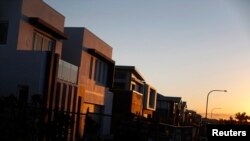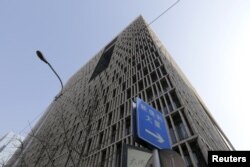China is second only to the United States in the scale of its investment in Australia, with interests in increasingly broad sections of the economy. But while Canberra welcomes overseas investment, there has been opposition to the influx of Chinese money.
Recent figures from the finance firm KPMG and the University of Sydney show that the state of New South Wales has attracted more than 70 percent of Chinese investment. The most popular sectors are infrastructure and commercial real estate, as Chinese interest in Australian mining industries fades.
Hans Hendrischke, professor of Chinese business and management at the University of Sydney, said that "the current major trend, and that has become very evident from last year, was investment in commercial real estate. ... But coming up are other areas, such as leisure, entertainment and renewable energy.”
Chinese investment in Australian agriculture is expected to increase following last December’s ratification of a free-trade agreement. But the buying of farms and land is contentious.
The government in Canberra has been criticized for allowing Australia's biggest dairy farming business, which comprises 25 farms and 30,000 cows, to be sold to a Chinese investor.
Opposition to sale
Businesswoman Jan Cameron tried unsuccessfully to purchase the Tasmania-based enterprise and said she thought selling it to China was not in Australia’s interests.
"They are trying to secure properties in Australia to support their population," Cameron said. "I do not blame them for that, but to some degree it is at our expense. And the Australian public have to understand that because of the need for the food security in China, they will never sell the agriculture properties that they buy here."
Chinese private equity firms have also bought dairy farms in other parts of Australia.
Craig Aplin, who farms in Victoria, said he thought foreign investment should be carefully monitored.
“Oh, I'd still like to think that the grass roots of Australian agriculture stays with Australians, you know, as a workforce," he said. "And not only that — it's a great environment to bring up our own children.”
Another area of contention is residential real estate. Although booming Chinese demand in Australia has cooled in recent months, millions of dollars of Chinese money is being poured into property.
More wealthy Chinese
Monika Tu, a Sydney real estate broker, has helped many Chinese millionaires buy lavish homes in Australia. She noted that over the last few years, since changes were made in the government visa system, "they welcome more foreign investors to come in. So we see more and more high-end-worth Chinese."
Tens of thousands of Chinese students attend Australian schools and colleges. Some will start to pursue careers after graduation, assisted by family investment in property, said David Milton, a director of CBRE Real Estate Services in Sydney.
“The main trend with the Chinese buyers is most of them have a single child, so they tend to invest offshore where that child's gone to university or where they've settled," he said. "So the money follows the family, as such.”
In 2014, it is estimated that Chinese investors poured $8.35 billion into Australia. Experts at the University of Sydney think that figure will grow as investors in China are attracted by a relatively positive outlook for the Australian economy and its stable institutions.





